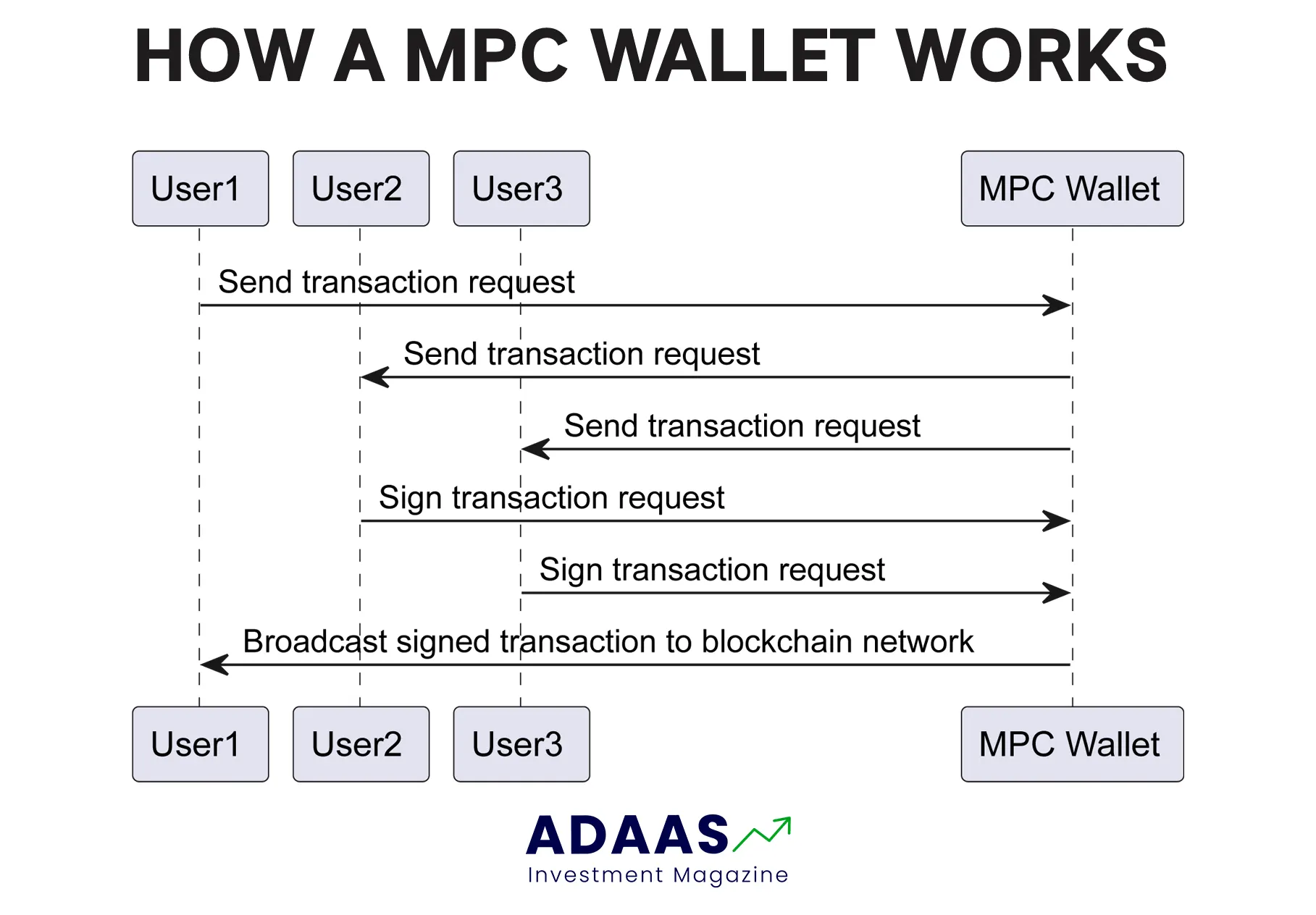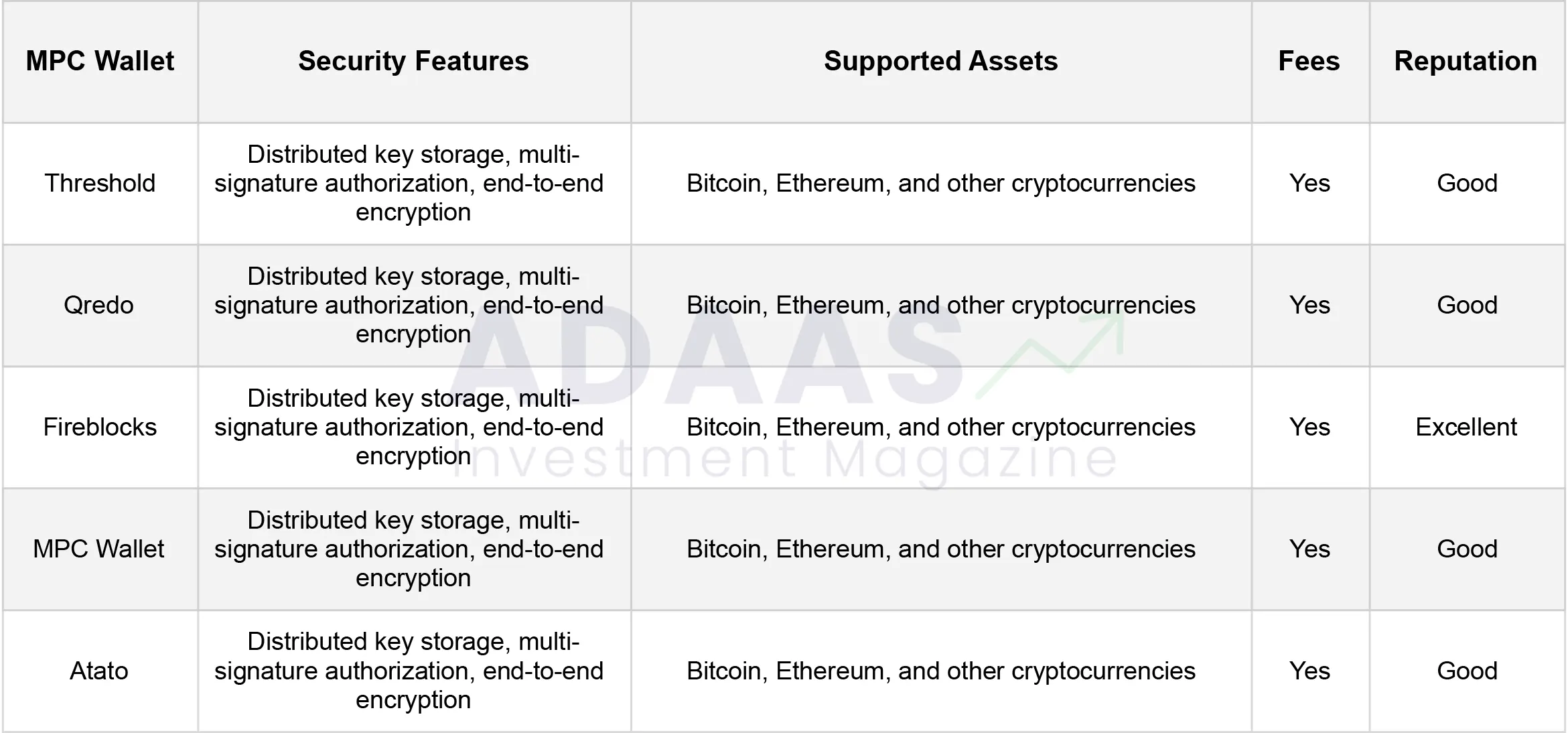Multi-Party Computation (MPC) Wallets Explained
Explore the Future of Digital Security with MPC Wallets: Your Comprehensive Guide
By reading the article “What Are MPC Wallets?” published in Adaas Investment Magazine, you will be fully familiar with the cryptographic magic behind Multi-Party Computation (MPC) wallets and explore use cases, overcome challenges, and choose the right MPC wallet for you. This level of familiarity can be enough when you need educational information about this topic.
Imagine a cryptocurrency wallet that is so secure that it cannot be hacked, even if one of the parties involved is compromised. Imagine a wallet that protects your privacy and makes it impossible for anyone to track your transactions. Imagine a wallet that is just as convenient to use as a traditional wallet.
In today’s digital world, secure transactions are more important than ever before. Whether you’re buying something online, sending money to friends and family, or investing in cryptocurrencies, you need to be confident that your transactions are safe and secure.
An MPC wallet is a cryptocurrency wallet that uses Multi-Party Computation (MPC) to secure its users’ funds. MPC is a cryptographic technique that allows multiple parties to jointly perform computations without revealing their individual inputs.
In the context of MPC wallets, the private key is divided into multiple shares, with each share distributed to a different party. To sign a transaction, all parties must collaboratively perform a cryptographic computation without revealing their individual key shares. This distributed approach eliminates single points of failure and makes MPC wallets significantly more resistant to hacking and theft.
Stay with us for a comprehensive review of Cryptocurrency MPC Wallets!
Table of Contents
Understanding Multi-Party Computation (MPC)
Multi-Party Computation (MPC) is a cryptographic technique that allows multiple parties to jointly perform computations without revealing their individual inputs. This is achieved through a complex series of mathematical operations that ensure that each party’s contribution to the computation remains confidential.
MPC has a wide range of applications, including secure voting, privacy-preserving data analysis, and secure multiparty computation. In the context of MPC wallets, MPC is used to distribute the private key across multiple parties, making it significantly more difficult to steal or compromise.
Cryptographic principles of MPC
MPC is based on a number of cryptographic principles, including:
– Secret sharing: MPC uses secret sharing to divide the private key across multiple parties in such a way that no single party can reconstruct the full key.
– Homomorphic encryption: Homomorphic encryption allows MPC protocols to perform computations on encrypted data without decrypting it first. This is essential for ensuring that the individual inputs of each party remain confidential.
– Secure oblivious transfer: Secure oblivious transfer allows MPC protocols to transfer data between parties without revealing the identity of the sender or the contents of the data. This is important for preventing collusion between parties.
Benefits of MPC for secure transactions
MPC offers a number of benefits for secure transactions, including:
– Enhanced security: MPC wallets are significantly more secure than traditional wallets, as they eliminate single points of failure. Even if one party is compromised, the attacker will not be able to steal the private key or sign transactions without the cooperation of the other parties.
– Privacy protection: MPC wallets protect users’ privacy by never revealing the full private key to any single party. This makes it impossible for anyone to track users’ transactions or steal their identities.
– Transparency: MPC wallets are transparent and auditable, as all transactions must be signed by all parties involved. This makes it easy for users to track their own spending and to verify the authenticity of transactions.
MPC is a powerful cryptographic technique that can be used to create secure and privacy-preserving multiparty computations. MPC wallets are a prime example of how MPC can be used to improve the security and privacy of digital transactions.
How MPC Wallets Work
MPC wallets work by distributing the private key across multiple parties. This is achieved through a complex series of cryptographic operations that ensure that no single party can reconstruct the full key.
To send a transaction using an MPC wallet, the user must generate a transaction request and send it to all of the parties involved. The parties then jointly perform a cryptographic computation to sign the transaction. Once the transaction is signed, it is broadcast to the blockchain network.
The role of multiple parties in the transaction process
Each party in an MPC wallet plays an important role in the transaction process. The parties are responsible for:
– Generating a share of the private key
– Storing their share of the private key securely
– Participating in the signing of transactions
– Verifying the authenticity of transactions
Distributed trust
MPC wallets rely on distributed trust to ensure the security of users’ funds. No single party has access to the full private key, so no single party can steal the funds or sign transactions without the cooperation of the other parties.
Multi-signature wallets
MPC wallets are similar to multi-signature wallets in that they require multiple signatures to authorize transactions. However, MPC wallets differ from multi-signature wallets in that the private key is distributed across multiple parties, rather than being stored in a single location.
Example of how an MPC wallet works
Imagine a group of three friends, Alice, Bob, and Carol, who want to jointly manage a bank account using an MPC wallet. They use an MPC wallet to distribute the private key across their three devices.
To send a transaction, Alice must first generate a transaction request and send it to Bob and Carol. Bob and Carol then verify the transaction request and sign it with their individual key shares. Once the transaction request has been signed by all three parties, it is broadcast to the blockchain network.
If an attacker tries to hack into Alice’s device and steal her share of the private key, they will not be able to sign transactions without Bob and Carol’s cooperation. This makes MPC wallets significantly more secure than traditional wallets, which only require the private key to be stored on a single device.
MPC wallets offer a number of advantages over traditional cryptocurrency wallets, including enhanced security, privacy protection, and transparency. MPC wallets are still in their early stages of development, but they have the potential to revolutionize the way we store and manage our digital assets.
How to Choose an MPC Wallet
When choosing an MPC wallet, there are a few essential factors to consider:
Security features
MPC wallets offer a number of security features, but not all MPC wallets are created equal. It is important to choose an MPC wallet with strong security features, such as:
– Distributed key storage: The private key should be distributed across multiple parties, with no single party having access to the full key.
– Multi-signature authorization: All transactions should require multiple signatures to authorize, preventing unauthorized transactions from being sent.
– End-to-end encryption: All communication between the parties involved in a transaction should be end-to-end encrypted, preventing eavesdropping and man-in-the-middle attacks.
Supported assets
Make sure that the MPC wallet you choose supports the cryptocurrencies and other digital assets that you want to use.
Fees
Some MPC wallets charge fees for transactions and other services. Compare the fees charged by different MPC wallets before choosing one.
Reputation
Choose an MPC wallet from a reputable company with a good track record.
Here is a comparison of different MPC wallet options on the market:
Tips for choosing the right MPC wallet
Here are a few tips for choosing the right MPC wallet for you:
– Consider your security needs. If you are storing a large amount of digital assets, you may want to choose an MPC wallet with additional security features, such as hardware security modules (HSMs).
– Consider the assets you want to store. Make sure that the MPC wallet you choose supports the cryptocurrencies and other digital assets that you want to use.
– Compare the fees charged by different MPC wallets. Some MPC wallets charge fees for transactions and other services.
– Choose an MPC wallet from a reputable company with a good track record.
By following these tips, you can choose the right MPC wallet for your needs and help to protect your digital assets.
MPC wallets offer a number of advantages over traditional cryptocurrency wallets, including enhanced security, privacy protection, and transparency. When choosing an MPC wallet, it is important to consider the security features, supported assets, fees, and reputation of the wallet.
Future Trends in MPC Wallet Technology
MPC wallet technology is still in its early stages of development, but it has the potential to revolutionize the way we store and manage our digital assets. Here is a discussion of some emerging trends and developments in the MPC wallet space:
Next-gen MPC wallets
Next-generation MPC wallets are being developed that will offer even greater security and performance than current MPC wallets. These next-gen wallets will incorporate new cryptographic techniques and technologies to make them even more resistant to hacking and theft.
Mass adoption of MPC wallets
As MPC wallet technology continues to mature and more MPC wallets are released, we can expect to see mass adoption of MPC wallets. MPC wallets offer a number of advantages over traditional cryptocurrency wallets, making them the ideal choice for both individuals and businesses.
MPC wallets for new use cases
MPC wallets are also being developed for new use cases, such as decentralized finance (DeFi) and Web3. DeFi applications require high levels of security and trust, and MPC wallets can provide these essential features. MPC wallets can also be used to enable new types of Web3 applications, such as secure decentralized voting and data sharing.
MPC wallets for institutional investors
Institutional investors are increasingly interested in MPC wallets as a way to securely store and manage their digital assets. MPC wallets offer a number of advantages for institutional investors, including:
– Enhanced security: MPC wallets are significantly more secure than traditional wallets, making them ideal for storing large amounts of digital assets.
– Compliance: MPC wallets can help institutional investors to comply with regulatory requirements, such as those related to know-your-customer (KYC) and anti-money laundering (AML).
– Auditing: MPC wallets are transparent and auditable, making it easy for institutional investors to track their assets and ensure compliance.
Predicting the future landscape of secure transactions
MPC wallets are poised to play a major role in the future of secure transactions. As the world becomes increasingly digital and the value of digital assets continues to grow, the need for secure and reliable ways to store and manage these assets will become even more important. MPC wallets offer a number of advantages over traditional wallets, making them the ideal choice for both individuals and businesses.
MPC wallet technology is rapidly evolving, and we can expect to see significant advancements in the coming years. Next-gen MPC wallets with even greater security and performance are being developed, and MPC wallets are being adopted for new use cases, such as DeFi and Web3. Institutional investors are also increasingly interested in MPC wallets as a way to securely store and manage their digital assets.
Use Cases and Applications of MPC Wallets
MPC wallets have a wide range of use cases and applications, including:
Financial transactions
MPC wallets can be used to securely store and manage cryptocurrencies and other digital assets. This is ideal for individuals and businesses who want to protect their digital assets from theft and hacking.
Healthcare data security
MPC wallets can be used to protect the privacy of sensitive healthcare data. By distributing the private key across multiple parties, MPC wallets make it impossible for any single party to access the full dataset. This is ideal for healthcare organizations and researchers who need to share data without compromising patient privacy.
Supply chain management
MPC wallets can be used to improve the security and transparency of supply chains. By tracking the movement of goods using MPC wallets, businesses can prevent fraud and ensure that products are not tampered with.
Other industries and sectors adopting MPC technology
MPC technology is also being adopted by a variety of other industries and sectors, including:
– Gaming: MPC wallets can be used to securely store and manage in-game assets, such as virtual currencies and items.
– Insurance: MPC wallets can be used to create new types of insurance products, such as decentralized insurance policies.
– Voting: MPC wallets can be used to create secure and auditable voting systems.
Real-world scenarios where MPC wallets prove beneficial
Here are a few real-world scenarios where MPC wallets prove beneficial:
– A group of friends want to jointly manage a cryptocurrency investment fund. They use an MPC wallet to distribute the private key across their devices and require multiple signatures to authorize transactions. This ensures that the funds are secure and that no single party can access or spend the funds without the consent of the others.
– A healthcare organization needs to share patient data with researchers for a clinical trial. They use an MPC wallet to encrypt the data and distribute the private key across multiple parties. This allows the researchers to access the data without compromising patient privacy.
– A global supply chain company needs to track the movement of goods from its suppliers to its customers. It uses an MPC wallet to create a tamper-proof record of the movement of goods. This helps the company to prevent fraud and ensure that products are not tampered with.
MPC wallets offer a number of advantages over traditional wallets, including enhanced security, privacy protection, and transparency. As MPC technology continues to develop and more MPC wallets are released, we can expect to see MPC wallets adopted for a wider range of use cases and applications.
Conclusion
Multi-Party Computation (MPC) wallets offer a number of advantages over traditional cryptocurrency wallets, including enhanced security, privacy protection, and transparency. MPC wallets work by distributing the private key across multiple parties, making them significantly more resistant to hacking and theft.
Key points discussed in the post:
– MPC wallets are more secure than traditional wallets because they eliminate single points of failure.
– MPC wallets protect user privacy by never revealing the full private key to any single party.
– MPC wallets are transparent and auditable, as all transactions must be signed by all parties involved.
– MPC wallets are just as convenient to use as traditional wallets.
– MPC wallets are still in their early stages of development, but they have the potential to revolutionize the way we store and manage our digital assets.
As the digital world becomes increasingly interconnected and our lives become more reliant on technology, the need for secure and reliable ways to store and manage our digital assets is more important than ever before. MPC wallets offer a number of advantages over traditional wallets, making them the ideal choice for individuals and businesses alike.
If you are looking for a safe and secure way to store and manage your cryptocurrencies and other digital assets, I encourage you to consider using an MPC wallet. MPC wallets offer the highest level of security currently available, and they are becoming increasingly user-friendly and accessible.
Disclaimer: Cryptocurrency investments carry risks. Readers should conduct their own research and consider their risk tolerance before using any tools.

The End Words
At Adaas Capital, we hope that by reading this article you will be fully immersed in Crypto MPC Wallets! You can help us improve by sharing this post which is published in Adaas Investment Magazine and help optimize it by submitting your comments.
FAQ
What is an example of an MPC wallet?
An example of an MPC wallet is Threshold. It is an open-source MPC wallet that supports Bitcoin, Ethereum, and other cryptocurrencies. Threshold is designed to be easy to use and secure, and it offers a number of features that make it ideal for both individuals and businesses.
What is MPC vs Multisig wallet?
MPC wallets are more secure than multisig wallets because the private key is distributed across multiple parties, making it more difficult to steal or compromise. However, MPC wallets are also more complex and require the use of an MPC protocol to generate signatures.
What are the types of MPC?
Synchronous MPC and asynchronous MPC are the two main types of MPC.
Synchronous MPC is generally simpler to implement than asynchronous MPC, but it is also less efficient, as it requires all parties to be online at the same time. Asynchronous MPC is more efficient, but it is also more complex to implement, and it can be more susceptible to errors.
Are MPC Wallets decentralized?
One of the key advantages of MPC wallets is that they are decentralized. This means that they are not controlled by any single entity, and they are not vulnerable to single points of failure. If one party in an MPC wallet is compromised, the attacker will not be able to steal the funds in the wallet.








you are really a good webmaster. The website loading speed is amazing. It seems that you’re doing any unique trick. Furthermore, The contents are masterwork. you’ve done a fantastic job on this topic!